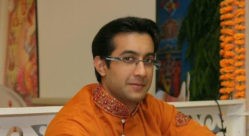Pundit Varistha Persad, SWAHA International
There is no surprise that we are seeking answers now on how to shift from the traditional ways in which humans function and, most importantly, how we perform and participate in communal pujas and yagnas, as the new normal puts into question the core recommendation of Sanatan Dharma, which is satsang (truthful association). The positive effects of gathering in large numbers with like-minded, holy people has become a tremendous challenge yet, believe it or not, there are clear and easy-to-follow guidelines for achieving such goals, thus ensuring that the vulnerable members who depend on temples and other places of worship are not left out. It is easy to question the need for office space and changing work environments but it becomes almost perverse to question the need for the temple, prepared spaces for worship and communal gatherings.
As the corporate world struggles to maintain high percentages of productivity and profitability, it is also a matter of public concern that places of worship are trying to maintain a basic level of functionality in order to cater to the emotional, mental and spiritual needs of members of society. It is absolutely no surprise that there are increases in suicide rates, opioid overdose, domestic violence, depression and frustration in all COVID-affected countries. It answers the question almost perfectly, that society cannot function on the most basic level without satsang and other communal activities. These problems can only be faced head-on by ensuring that we maintain a sense of normalcy and create opportunities for our Hindu brothers and sisters.
In the present and post-COVID-19 world, many will sacrifice the wrong things while balancing the books and surviving on a day-to-day basis. In the new world, the essence of religion and spirituality is undergoing a concerning shift. Our society has now become an open competitive market, providing an oversupply of pundits, priests and (online) religious leaders to feed the growing demand for the new, young, trending and even fashionable methods of engaging in satsang. How do these online meeting spaces help feed the poor, needy and vulnerable in society? In addition, in how many other rituals and aspects are we becoming delinquent as practising Hindus?
When Hindus attend the mandir either for weekly devotional services or for festivals and celebrations, there are many activities that engage members of all ages. Apart from prayer, worship and so on, charitable opportunities present themselves and the poor benefits. As we are forced to stay inside, live in smaller social networks and shift from the external to the internal, life as we know it can change for the better as we are now able to do what we have neglected for years: leaving the house, family and loved ones to pursue jobs that sapped our time and energy. As Hindus, we should not be depressed about working from home as we are now able to control our schedules and live better and more meaningful lives. Offering jal, performing havan, mantra jaap, yoga and meditation daily are now all possible because of this shift that should have happened with or without the threat of COVID-19.
As we engage in satsang and maintain smaller social circles, the essence of satsang or truthful association is now understood fully as people living under these new circumstances are starting to realize who the people are that they can live with and the ones they can live without. All along, our scriptures have maintained that our circles of trust should be small as life’s mission is not to be the most popular. As we celebrate Divali 2020, let us remember once again, the importance of the family unit and keeping close to only those who can influence us positively in our lives. This is the key to elevating our spirituality as the focus shifts from the external to the internal.



